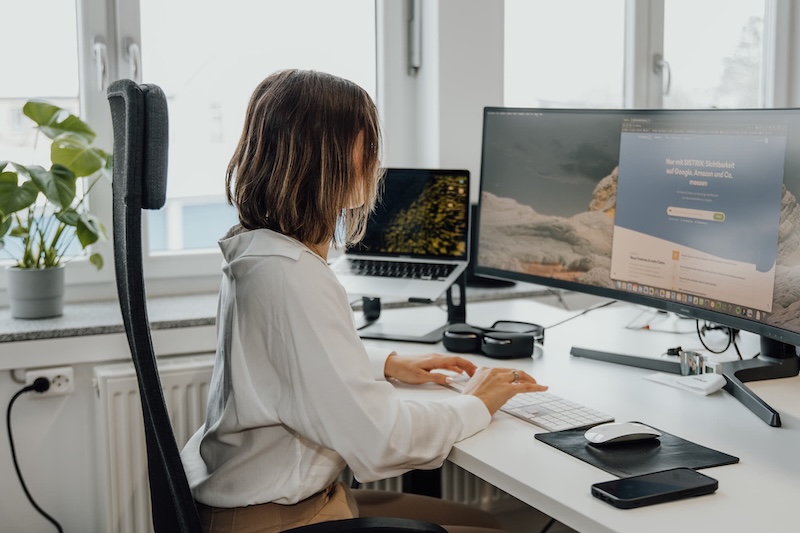
Offpage optimization: SEO strategies for more reach

.webp)

The most important facts in a nutshell






.webp)

Then now is the right time! Together we will turn your website into your strongest sales channel - with a clear strategy and measurable growth.
Get free adviceOff page optimization is an essential part of the SEO strategy to increase your website's visibility and generate more organic traffic. With targeted measures outside of your website, such as building high-quality backlinks and effective content marketing, you can improve your position in Google search results in the long term. In this way, you significantly increase your online presence.
Successful offsite optimization requires a strategic approach and the combination of various SEO tactics. Link building forms the basis for strengthening the authority of your website and ranking for highly competitive search terms. In addition, you should use content marketing to create high-quality and informative content that promotes natural links. This can help potential customers trust your brand. Social media marketing and influencer collaborations also play an important role in off-page SEO. With 93% of Internet users having at least one social media account, social networks offer tremendous reach for your brand. By working with influencers, you can also reach new target groups and benefit from their recommendations
Offpage SEO: The importance and most important measures
Offpage SEO includes all measures outside of your website that aim to improve your visibility and ranking in search engines. While on-page optimization focuses on website content and technical improvements, off-page optimization strengthens the authority and relevance of your website through external signals such as high-quality backlinks, social media marketing and online reviews. These off-page factors show search engines that your content is trustworthy and valuable to your users. The most important off-page strategies include link building, social signals, and content marketing. Link building focuses on gaining high-quality and thematically relevant backlinks from trustworthy websites, as such links increase the credibility and relevance of your website and thus positively influence the ranking. Social signals are created by spreading and interacting with your content on social media and contribute to visibility and strengthening your brand image, while positive reviews from satisfied customers build trust and positively influence buying decisions. Content marketing also plays a central role in off-page optimization: High-quality content published on external platforms expands reach and generates additional traffic. Guest articles on relevant blogs or contributions to specialist events are effective ways to demonstrate expertise and gain valuable backlinks. Ultimately, the interplay of all SEO measures ensures sustainable success. A solid on-page basis supports off-page optimization and makes it possible to sustainably increase the ranking and reach of your website through the combination of content quality, technical optimization and strong external presence.
Important off-page factors for SEO
The most important off-page factors include high-quality backlinks, social signals, online reviews and content marketing. Backlinks are links from other websites that link to your site. The more trustworthy and topic-relevant sites link to you, the higher search engines rate your authority. According to a backlink study from 2020, pages in number 1 of the SERPs had an average of 3.8 times more backlinks than pages in places 2-10. Social signals, such as likes, shares, and comments on social media platforms, signal to search engines that your content is popular and relevant with users. Positive online reviews and mentions of your brand also help build trust and authority. Through strategic content marketing, such as guest posts on other blogs or creating informative infographics, you can gain natural backlinks and increase your reach.
Difference between on-page and off-page optimization
While on-page optimization focuses on elements such as page structure, load speed, and keyword optimization within your website, off-page optimization is about how other websites and platforms perceive and rate your page. By effectively combining both approaches, you can holistically improve your SEO and benefit from better rankings in the long term.
Backlinks and link building: The basis of off-page optimization
Backlinks are a central factor of off-page optimization to signal the importance of a website for search engines. It is not just about the quantity, but above all about the quality of the backlinks. Search engines like Google rate backlinks as an indicator of the relevance and trustworthiness of a website.
types of backlinks
A distinction is made between different types of backlinks:
- Dofollow links: These links transfer so-called “link juice” and help improve search engine rankings.
- Nofollow links: These links don't transfer “link juice,” but they can still be valuable for building brand awareness and traffic.
- Organic backlinks: These are of course created by high-quality content that encourages users to link.
- Artificial backlinks: These are actively set, for example through guest posts or link exchanges.
Effective link building strategies for a strong backlink profile
In order to build a strong backlink profile, there are various strategies for effective link building:
- Create high-quality, relevant content that attracts natural backlinks
- Guest posts on authoritative websites in your industry
- Active participation in forums and comments with valuable contributions
- Registration in relevant industry directories and company profiles
- Using PR methods such as press releases or expert interviews
Backlink analysis tools
Special tools such as Semrush or Ahrefs are suitable to analyze and optimize your backlink profile. These tools allow you to check the number and quality of your backlinks, identify new link building opportunities, and uncover potential negative backlinks that could hurt your ranking.
The importance of social signals and reviews
Social signals, i.e. feedback and interactions from users on social media platforms, are becoming increasingly important for search engine optimization. Although, according to Google, they are not directly incorporated into the ranking algorithms, they can indirectly have a positive impact on your visibility in search results. Meta tags such as Meta Title and Meta Description help by offering users an appealing preview in search results, which can increase the click rate and ultimately also the social signals. A high number of likes, shares, comments and mentions on social networks such as Facebook, Twitter, Instagram or LinkedIn signals to search engines that your content is relevant and trustworthy. This can lead to an improved perception of your brand and an increased brand image. Online reviews on platforms such as Google My Business, Yelp or industry-specific portals also contribute to forming opinions. Positive reviews strengthen potential customers' trust in your products or services and can therefore indirectly contribute to a better positioning in search results.
- Actively use social media channels to share high-quality content and interact with your target audience
- Encourage your customers to leave reviews on relevant platforms
- Use social sharing plugins on your website to make sharing your content easier
- Monitor your social signals using monitoring tools like Hootsuite or Talkwalker
Through targeted social media marketing and collaboration with influencers, you can further increase your reach. Successful campaigns can not only lead to increased interaction on social platforms, but also generate valuable backlinks that have a positive effect on your search engine ranking.
Content marketing as support for off-page SEO
Content marketing plays a central role in off-page optimization. By creating high-quality content, you can not only inform and inspire your target group, but also generate valuable backlinks. Good content in the form of guest articles and a well-thought-out content strategy promotes organic links and thus supports your SEO efforts. An effective content strategy aims to create relevant and informative content that appeals to your target group and provides added value. By publishing high-quality articles, infographics or studies on topic-relevant websites, you increase the visibility of your brand and promote natural links. The more useful and interesting your content is, the higher the likelihood that other websites will link to it.
Guest articles as a strategy for backlinks
Guest articles are also an important part of a successful content marketing strategy. By writing guest posts on reputable websites in your industry, you can not only demonstrate your expertise, but also generate valuable backlinks. Make sure that your guest articles offer real added value and are not perceived as pure advertising. High-quality content that informs and entertains has the best chance of being linked organically.
Content distribution for maximum reach
In order to maximize the reach of your content, targeted distribution across various channels is essential. Use social media such as Facebook, Twitter, and LinkedIn to share your content and engage with your audience. By actively participating in online communities and forums, you can draw additional attention to your content and promote natural links. A well-thought-out SEO content strategy forms the basis for successful off-page optimization. By combining high-quality content, guest articles and targeted content distribution, you strengthen your online presence and help build authority and trust. Invest in content marketing to benefit from the benefits of effective off-page SEO in the long term.
conclusion
Offpage optimization is an essential pillar of your SEO strategy and makes a decisive contribution to strengthening your website's position in search results and expanding its reach. Through targeted backlink development, active social media marketing and the distribution of high-quality content, you will achieve a sustainable increase in your visibility and build trust with your target group. A balanced combination of on-page and off-page measures is essential for success. On-page optimization lays the technical and content foundation by improving the website itself. A targeted off-page strategy reinforces this effect by showing through external signals such as backlinks and social signals that your site is relevant to users and search engines. A holistic SEO strategy that focuses on building backlinks, managing social channels, content distribution and online PR offers long-term benefits. Tools such as Ahrefs, Semrush and SISTRIX help you monitor the progress of your measures and further develop them in a targeted manner. With this comprehensive approach, you can continuously improve your ranking in search results, gain more organic traffic, and attract the attention of potential customers.
FAQ
What is off-page optimization?
Offpage optimization includes all SEO measures that take place outside your own website to increase the visibility and authority of the website. This includes building high-quality backlinks, using social media channels, content marketing and generating positive online reviews.
Which off-page factors influence search engine ranking?
Important off-page factors for ranking include high-quality backlinks, social signals such as likes, shares and comments on social platforms, online reviews and the distribution of relevant and informative content via various channels.
What link building strategies are there?
Effective link building strategies include creating high-quality guest posts on topic-relevant blogs, participating in forum discussions, mentioning in industry directories, and using PR methods. It is important to ensure a natural link structure and to consider the quality of the linking pages.
How do social signals influence search engine rankings?
Social signals, i.e. likes, shares, comments and mentions on social media platforms, are important criteria for evaluating the relevance and popularity of a website. A high number of positive social signals can have a positive effect on the ranking and increase visibility in search results.
What role does content marketing play in off-page optimization?
High-quality, informative content promotes natural links and thus supports off-page optimization. By publishing guest articles, creating linkable assets such as infographics or studies, and disseminating them via social media channels, you can increase the reach of content and thus also the number of backlinks.
Why is a holistic approach to search engine optimization important?
SEO success requires a holistic approach that combines on-page and off-page optimization as well as technical aspects. Only through the interplay of all measures can a sustainable improvement in ranking and visibility in search results be achieved.
Are you ready for rocket growth?
Arrange your personal consultation now and find out how we can help you get ahead in search engine marketing. Whether you run a small company or are responsible for a large corporation - we will find the right solution for you.


.svg)
.webp)
.webp)




.webp)
.jpg)



.webp)








